-
CENTRES
Progammes & Centres
Location
A new dawn emerges for the G7 and Quad alliances, in their resolute response to China's technological ascendancy and its implications for global security and competitiveness.

In the picturesque setting of Hiroshima, Japan, the G7 summit unfolded in May 2023, drawing global leaders into a crucible of critical discussions. Amidst this gathering of Western economies, the Quad leaders convened on the sidelines, their presence hinting at a shared vision and the potential to counterbalance China's advancements across a number of issues including telecommunications, Artificial Intelligence, 5G networks, and high-tech manufacturing.
Delving into the national security concerns surrounding China's technological advancements and the strategic convergence of the G7 and Quad alliances in addressing them, this piece highlights the collaborative vision within these alliances and emphasises India's role. The shared goal is to shape technology for the common good and uphold a rules-based international order.
India enacted measures seeking to ban WeChat in 2020, citing concerns over data privacy, security, and potential censorship by the Chinese government.
There are heightened concerns surrounding national security, specifically regarding potential government influence, espionage, and intellectual property theft associated with Chinese technology companies like Huawei, ZTE, TikTok, Tencent WeChat, and DJI. A prominent case involves the Huawei 5G rollout in 2019 which is a crucial tool impacting not just the national security but also the economy, society, and cities. Likewise, India enacted measures seeking to ban WeChat in 2020, citing concerns over data privacy, security, and potential censorship by the Chinese government. Conversely, under the Biden administration in 2021, the previous bans on TikTok and WeChat, enacted during the Trump presidency, were revoked. Instead, a comprehensive security review of foreign-owned applications was established, aiming to assess potential risks and safeguard national security interests.
The following analysis explores the intricate web of national security apprehensions where the shadows of Chinese technology loom large. Additionally, China's expanding geopolitical influence, exemplified by initiatives like the Belt and Road Initiative, has triggered strategic responses from the G7 and the Quad. For instance, Japan will impose strict restrictions on semiconductor exports to China by July 2023, like those of the United States (US), while the Biden administration pressures Taiwan and South Korea to do the same. In response, China has retaliated by banning chips from US-based chip manufacturer Micron Technology, leveraging dominance in rare-earth metals crucial for the green transition, which are essential components in various high-tech devices, including chips. By restricting the export of rare-earth metals, China can indirectly impact the chip manufacturing industry and disrupt the global supply chain. However, Micron, in its statement, said that it is committed to China and would invest 4.3 billion yuan (US $603 million) over the next few years in its chip packaging facility in the Chinese city of Xian.
China's expanding geopolitical influence, exemplified by initiatives like the Belt and Road Initiative, has triggered strategic responses from the G7 and the Quad.
Moreover, in response to these national security concerns, both the G7 and Quad alliances have implemented coordinated efforts to address the implications, encompassing trade restrictions, export controls, and collaborative endeavours to navigate the complex landscape, highlighting a strategic convergence.
The G7 and Quad have expressed concerns about the dominance of Chinese telecom giant Huawei in the development and deployment of 5G infrastructure, encouraging their member countries and other allies to limit or exclude Huawei from their networks due to potential security risks, promoting trusted alternative vendors for 5G technology. Notably, the Quad leaders also demonstrated their commitment in Hiroshima to shore up regional institutions—ASEAN, Pacific Island Forum (PIF), and the Indian Ocean Rim Association (IORA)—and their decision to set up and expand infrastructure fellowships, undersea cable connectivity, radio and telecom networks, and maritime domain awareness, signalling their acknowledgement of the clear and present danger posed by China.
Canada is implementing a mandatory screening process for its scientists to ensure that government funding is not inadvertently used to support R&D programmes that could be harmful or adversarial to their government, which is a broader measure to mitigate potential risks associated with foreign influence, including that of China. Japan has established a new cabinet-level position called the Minister for Economic Security, whose role is to safeguard the country's supply chains, intellectual property, and critical infrastructure from economic espionage. The European Union (EU) is also preparing to adopt export controls on semiconductors, impose restrictions on private sector investment in Chinese tech companies, and enact rules intended to block China from dominating Europe’s renewable energy market.
Japan has established a new cabinet-level position called the Minister for Economic Security, whose role is to safeguard the country's supply chains, intellectual property, and critical infrastructure from economic espionage.
Aligned with the collaborative vision, the possibility of capitalising on its domestic strengths, encompassing a thriving IT industry, skilled workforce, and vibrant startup ecosystem, also makes India an invaluable member. Engaging in transformative sectors like digital technology, human capital development, and innovation also solidifies India’s pivotal role, contributing to the shared objectives of fostering innovation, creating economic opportunities, and ensuring sustainable growth in the region.
These actions signify a shift in the G7 and Quads’ approach, reflecting their recognition of China's predatory practises, including disseminating China's likely launch of AI regulations; the EU first draft law on AI Act; and establishing a common standard for sharing knowledge, addressing global challenges, and promoting innovation for the Quad and G7 member countries.
The Quad and G7 alliances cultivate a collaborative environment, fostering the exchange of knowledge, a synergy between the public and private sectors, and the transformation of ideas into impactful solutions. The collective expertise and resources of member nations, make these alliances catalysts for innovation, driving progress, and addressing global challenges with shared determination. The alliances are pioneering a trajectory towards a future characterised by technological prowess, grounded in the principles of openness, attained through the establishment of open and rules-based trade, investment, and economic cooperation; transparent governance and decision-making processes, incorporating consultations, discussions, and stakeholder engagement, serve as the bedrock; while inclusivity features prominently, recognising the significance of involving diverse nations with shared values and interests in deliberations and endeavours concerning technological progress, economic growth, and regional security.
The collective expertise and resources of member nations, make these alliances catalysts for innovation, driving progress, and addressing global challenges with shared determination.
As the digital landscape continues to evolve at a rapid pace, the Quad and G7 member countries stand poised to shape the narrative, steering technology towards a trajectory that serves the common good, referring to the shared goals and interests of the member countries in utilising technology for the betterment of society. Quad’s promotion of the Digital Connectivity Partnership; and G7 GDPR, establishes inclusion, ensures privacy and data protection, fosters innovation and economic growth, enhances cybersecurity, and addresses global challenges.
Through their shared assessments, the Quad and G7 have acknowledged China’s technological advancement in domains like 5G telecommunications, quantum computing, and biotechnology. China’s tech sector also holds immense economic significance by offering a vast consumer base and market potential, raising legitimate national security concerns amongst Quad and G7 member countries. Given these facts, the Quad and G7 have come to a common resolve to address the rise of China's tech sector by promoting technological cooperation, strengthening domestic tech capabilities, fostering innovation, and maintaining a vigilant stance on national security risks. This joint resolve reflects a pragmatic response to the realities of China's technological advancements while prioritising the protection of shared values, national interests, and a rules-based international order.
Kethoseno Peseyie works as an Research Assistant with the Centre for Security Strategy and Technology at the Observer Research Foundation.
The views expressed above belong to the author(s). ORF research and analyses now available on Telegram! Click here to access our curated content — blogs, longforms and interviews.

Ritam Dubey is a Consultant at Sattva Consulting and a trained Health Psychologist.
Read More +